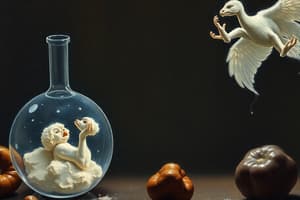Podcast
Questions and Answers
What is the main idea behind the Law of Definite Proportions?
What is the main idea behind the Law of Definite Proportions?
- The ratio of the masses of the elements in a compound varies depending on the source of the original substance.
- The masses of the constituents of a compound always have the same proportions. (correct)
- The total mass of matter after a chemical reaction is less than the total mass of matter before the reaction.
- Matter cannot be created or destroyed, only converted from one form to another.
What is the carbon-to-hydrogen mass ratio in isooctane?
What is the carbon-to-hydrogen mass ratio in isooctane?
- 5.33:1 (correct)
- 3:1
- 5:1
- 10:1
What is the main idea behind the Law of Multiple Proportions?
What is the main idea behind the Law of Multiple Proportions?
- The weights of one element that combine with a fixed weight of another element are integer multiples of one another. (correct)
- The ratios of the masses of the elements in a compound are always whole numbers.
- The total mass of matter after a chemical reaction is always equal to the total mass of matter before the reaction.
- The masses of the elements in a compound always have the same proportions.
What is an example of an element that forms multiple oxides?
What is an example of an element that forms multiple oxides?
Who formulated the Law of Definite Proportions?
Who formulated the Law of Definite Proportions?
What is the fundamental principle behind the law of conservation of matter?
What is the fundamental principle behind the law of conservation of matter?
What is the condition required for the law of conservation of matter to apply?
What is the condition required for the law of conservation of matter to apply?
What is the result of a physical or chemical change according to the law of conservation of matter?
What is the result of a physical or chemical change according to the law of conservation of matter?
What is the concept that argues that what exists now has always existed?
What is the concept that argues that what exists now has always existed?
Who restated the principle of 'nothing comes from nothing' for chemistry?
Who restated the principle of 'nothing comes from nothing' for chemistry?
Flashcards are hidden until you start studying




